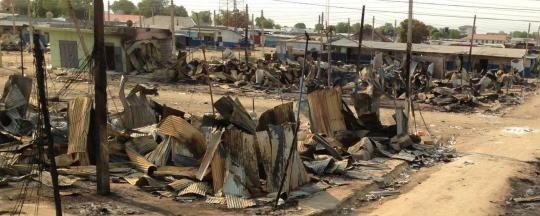A new study warns that South Sudan risks facing devastating economic consequences if the civil war doesn’t stop.
South Sudan will lose between 22.3 billion and 28 billion US dollars over the next 1 to 5 years if the conflict continues, and between 122 billion and 158 billion US dollars over twenty years if “flow on effects” are considered, according to the study, titled “South Sudan: the Cost of War.”
“South Sudan can ill-afford the economic costs of war, but after decades fighting for independence from its northern neighbor, it is even less equipped to bear the heavy social costs of another generation growing up in a violently divided society,” said the new economic study, which was conducted by the Frontier Economics think tank, the University of Juba, and a Ugandan organization called the Center for Conflict Resolution (CECORE).
“The longer the violence continues, the further it spreads, and the more insidious it becomes, the more difficult the task will be for South Sudan to undergo the kind of social, psychological and eocnomic transformation needed to achieve lasting peace,” it continued.
The economic losses for South Sudan are due to displacement, destruction of infrastructure, loss of life, humanitarian disaster, and disrupted trade, as well as reduced oil production.
“Just taking the effects of hunger on labour productivity could mean a further $6 billion in lost GDP if the conflict were to last another 5 years,” the report said.
The study found that five more years of war would result in a $2.2 billion increase in security spending. That is roughly equal to the amount South Sudan needs to spend to meet the internationally recommended target of allocating 20% of government spending to education.
“The cost of defense has increased, and this is often at the expense of other factors like education, health, and water,” said Rose Othieno, CECORE executive director, speaking at the release of the study’s results in Nairobi.
South Sudanese human rights worker Elizabeth Deng of Amnesty International said that the cost of the war would be less if the warring parties had respected international humanitarian law by not attacking civilian infrastructure such as hospitals.
Amar Breckenridge, an economist with Frontier Economics, said that difficulties accessing all parts of South Sudan to measure the effect of the war on informal economies means that the study’s estimates are conservative.
“The report probably understates the true cost of the conflict,” he said.
Still, Augustino Mayai Ting, a researcher at the Juba-based Sudd Institute, said that the report is the most robust projection of South Sudan’s economic future yet published.
Activist Edmund Yakani said at the event that reductions in basic services and salaries to civil servants due to the conflict could lead to an increase in violence and instability.
“If the conflict doesn’t stop and if the violence keeps on continuing there will be very huge economic disruption in the long term and that will result in really uncontrollable violence,” he said.
Regional impact
Breckenridge pointed out that while some individuals may be profiting from the war, these gains are small compared to the greater economic impact in South Sudan and the region.
Neighboring countries of Ethiopia, Kenya, Sudan, Tanzania, and Uganda could lose up to 53 billion US dollars over the next five years because of lost business with South Sudan and refugee influxes into their countries.
Meanwhile, the international community will have to pay 30 billion dollars for peacekeeping and humanitarian assistance if the fighting goes for another half decade.
The report’s authors urged the international community to “dramatically raise the pressure” on the warring parties to end the war.
“A central finding of this report is the need for early action. The costs of conflict to South Sudan, its neighbors and the international community are likely to increase at an accelerating rate the longer the conflict persists.”
Correction: a previous version of this article mis-stated that South Sudan would lose 122-158 billion US dollars if the war lasts for 20 years. According to the “South Sudan: Cost of War” study, South Sudan could lose that amount over 20 years as a result of future flow-on effects from the ongoing conflict.




